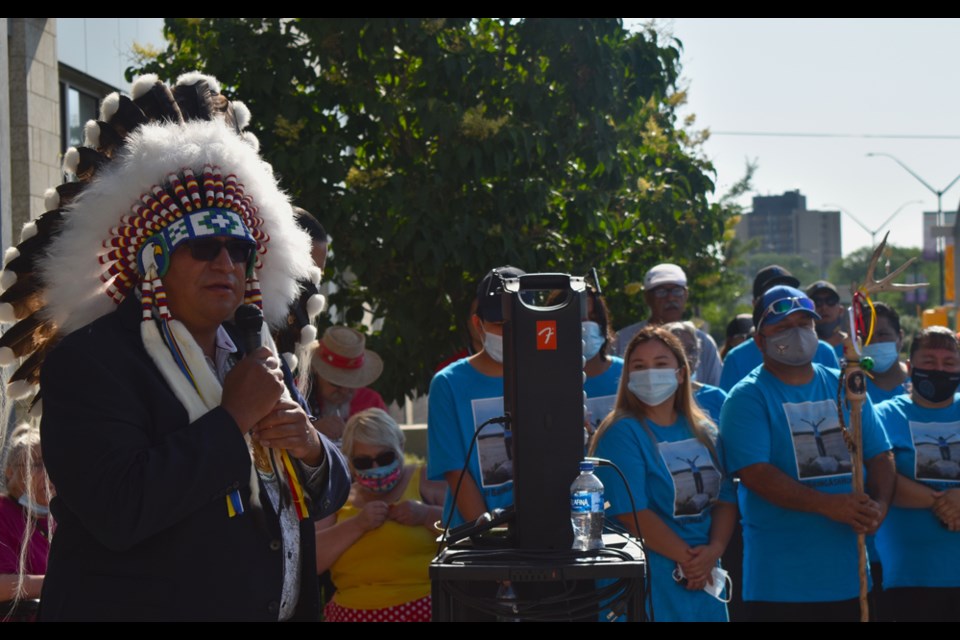(First of two parts)
SASKATOON —Indigenous women’s rights activist Darlene R. Okemaysim-Sicotte says she is pleased with the progress made in raising awareness of Missing and Murdered Indigenous Women, Girls and Two-Spirit People, more than a decade since beginning the journey of addressing the growing cases of violence against them.
Okemaysim-Sicotte is one of the individuals who is leading Women Walking Together, or Iskwewuk E-wichiwitochik in Cree. She is the co-chair of the group that’s advocating to raise awareness and bring the stories of MMIWG2s cases into the public. She is part of the core group with Myrna LaPlante joining her as Keeper of the Circle/Family.
She has been involved with Iskwewuk E-wichiwitochik since it started in September 2005. She answered the call made by concerned citizens looking to raise more awareness on the plight of missing Indigenous women in Saskatoon.
Okemaysim-Sicotte said she was still working as the secretary of the University of Saskatchewan’s then Native Studies Department when responded to a call from city Race Relations Co-ordinator Monica Goulet and Saskatchewan Human Rights Chair Donna Scott.
Goulet now works as an Indigenous relations consultant with the Saskatoon Police Service while Scott now sits as a judge at the Provincial Court of Saskatoon after being appointed to the bench in 2007.
“We met about 50 of us at the White Buffalo Youth Lodge that September [2005]. My first role was a member and subsequently named to be the record keeper and liaison to the MMIWG2s families and during the International Human Rights Day on Dec. 10 [same year],” Okemaysim-Sicotte told SASKTODAY.ca.
She added that having a bachelor’s degree in sociology and women’s studies helps her navigate the complex situation being experienced by families who are looking for some closure on their relatives who remain missing or are still seeking justice for loved ones who suffered violent deaths.
Okemaysim-Sicotte said being involved with Iskwewuk E-wichiwitochik was also close to her heart.
“The extended family on my father’s side had a missing person, but it was during a time when I had no skills to use to help our kinship relationships. The awareness work was something I could contribute to and my ability to work in large environments.”
Iskwewuk E-wichiwitochik is a grassroots group composed of activists and academics who help MMIWG2s families in raising awareness and prevention of violence against Indigenous women and girls.
Aside from maintaining a network of other organizations that share their advocacy, they also use education and political action in raising awareness of the systemic issue of racism that is considered a factor in the violence experienced by women, particularly the Indigenous.
Okemaysim-Sicotte said Saskatoon is one of the cities at the forefront when it comes to awareness and advocacy on the issue of MMIWG2S. Iskwewuk E-wichiwitochik’s almost two-decades-long work in the city has resulted in interagency partnerships that led to a national investigation of violence against Indigenous women and girls.
“As part of the inquiry, Saskatoon was selected as one of the nine family hearing sites in Canada in November 2017 and we gained national attention because of our [focus] on the issue, which led to having cases going to trial and incarceration to the perpetrators,” Okemaysim-Sicotte added.
“Saskatoon was also one of several cities that requested a federal inquiry and created an advisory circle on MMIWG2S after the final report of inquiry. To date, we completed a report published and launched in July 2021. In winter 2021, we presented a budget request for the establishment of a Matriarch’s office that was granted for 2022 to 2024 fiscal years.”




